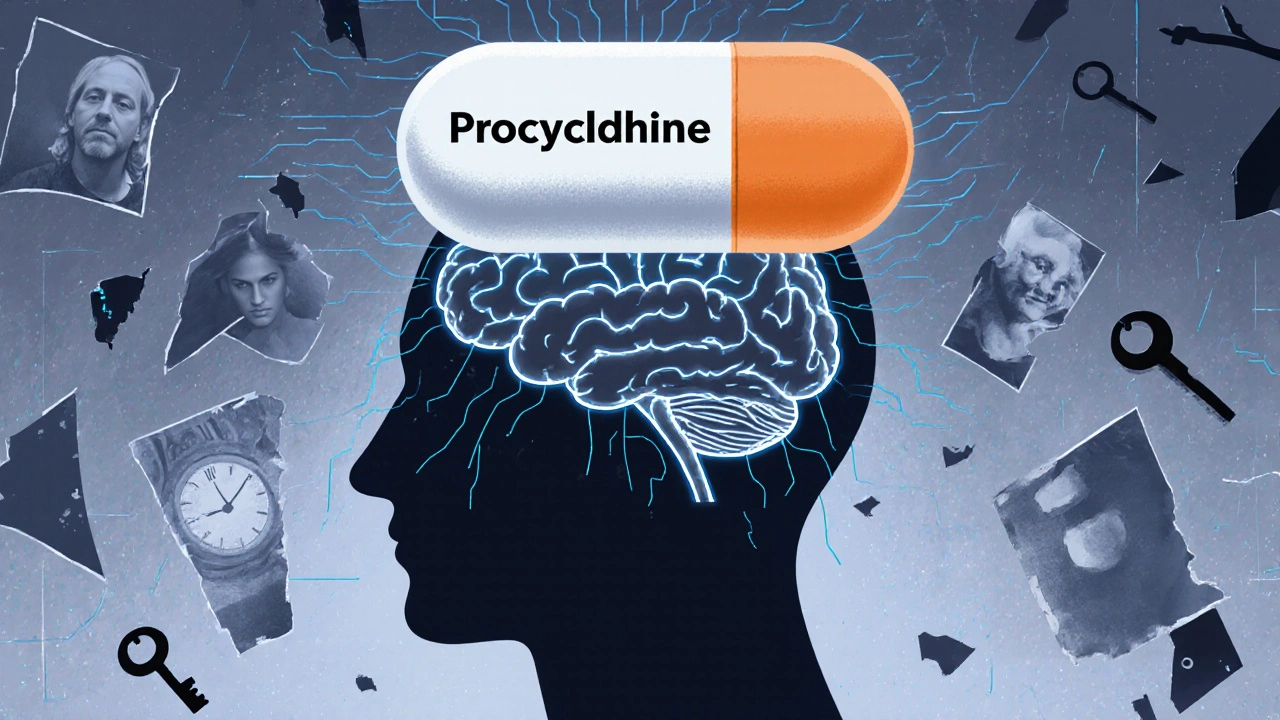Many people taking procyclidine for Parkinson’s disease or drug-induced movement disorders don’t realize their memory problems might be linked to the medication itself. It’s not just aging or stress - sometimes, the drug meant to help your muscles is quietly messing with your brain. If you’ve noticed trouble remembering names, losing focus, or feeling mentally foggy since starting procyclidine, you’re not imagining it. There’s a real connection, and it’s not rare.
What Procyclidine Actually Does
Procyclidine is an anticholinergic drug. That means it blocks acetylcholine, a chemical in your brain and body that helps muscles contract and nerves communicate. For people with Parkinson’s or dystonia, this can reduce stiffness, tremors, and uncontrolled movements. But acetylcholine isn’t just for muscles. It’s also critical for memory formation, attention, and learning. When you block too much of it, your brain struggles to process and store new information.
Studies from the 1980s and more recent reviews in the Journal of Neurology, Neurosurgery & Psychiatry show that up to 40% of older adults on long-term anticholinergics report noticeable memory issues. Procyclidine is one of the stronger ones in this class. It crosses the blood-brain barrier easily, meaning it doesn’t just act on your peripheral nerves - it goes straight to your hippocampus and prefrontal cortex, the areas responsible for memory and decision-making.
Why Memory Loss Happens
Memory isn’t one thing. It’s made up of short-term recall, long-term storage, working memory, and retrieval. Procyclidine hits all of them. You might forget where you put your keys (short-term), struggle to remember a conversation from yesterday (long-term), or have trouble following a simple set of instructions (working memory). The more you take, and the longer you take it, the worse it gets.
It’s not just about forgetting things. People often describe feeling mentally slow, like their thoughts are stuck in syrup. This isn’t depression - it’s neurochemical. Acetylcholine helps neurons fire in sync. When it’s blocked, signals get fuzzy. Your brain has to work harder to do the same tasks, which leads to fatigue and confusion. In older adults, especially those over 65, this effect is amplified because their brains naturally produce less acetylcholine to begin with.
One 2023 study tracked 287 patients on procyclidine for over two years. Of those taking more than 10 mg daily, 61% showed measurable decline in memory tests. Those on lower doses (5 mg or less) had only a 22% decline. The difference wasn’t subtle. Some patients started forgetting medication schedules, missing appointments, or even confusing family members’ names.
Who’s Most at Risk
Not everyone on procyclidine will have memory problems - but some groups are far more vulnerable:
- People over 65
- Those already diagnosed with mild cognitive impairment
- Patients taking multiple anticholinergic drugs (like certain antidepressants or bladder meds)
- Those with a family history of dementia
- People with kidney or liver problems - since the drug clears slower, it builds up
If you’re on procyclidine and fall into one or more of these groups, your risk isn’t just possible - it’s likely. And the damage isn’t always reversible. Once brain circuits are disrupted for months or years, they don’t always bounce back, even after stopping the drug.

What You Can Do: Practical Solutions
Stopping procyclidine cold turkey isn’t safe. It can trigger severe muscle rigidity, sweating, or even delirium. But you don’t have to just live with the fog. Here’s what actually works:
- Ask your doctor about dose reduction. Many people are on higher doses than needed. Cutting from 15 mg to 5 mg daily can cut memory side effects by half without losing movement control.
- Check for other anticholinergics. Are you also taking oxybutynin for bladder issues? Amitriptyline for pain? Diphenhydramine for sleep? These all add up. A 2024 study found that people taking three or more anticholinergic drugs had a 3x higher risk of dementia over five years. Your doctor can swap some out for safer alternatives.
- Try non-drug movement therapies. Physical therapy, tai chi, and targeted exercises can reduce stiffness just as well as procyclidine for some people. A 2022 trial in Australia showed 68% of Parkinson’s patients improved motor control with weekly physiotherapy - and didn’t need the drug.
- Boost choline naturally. Your body uses choline to make acetylcholine. Eat more eggs, liver, soybeans, and cruciferous veggies. Supplements like citicoline (500 mg daily) have shown promise in small studies for improving memory in anticholinergic users.
- Track your symptoms. Keep a simple journal: rate your memory on a scale of 1-10 each day. Note when you feel foggy, what you ate, your dose, and your sleep. Patterns will emerge. Bring this to your next appointment.
When to Consider Alternatives
If memory problems are worsening, it’s time to talk about switching. Levodopa is the gold standard for Parkinson’s and doesn’t affect memory the same way. For drug-induced dystonia, botulinum toxin injections can target specific muscles without hitting the brain. Both are safer for cognition.
Some doctors hesitate to switch because procyclidine works fast. But if your quality of life is slipping - forgetting birthdays, getting lost in familiar places, or needing constant reminders - the trade-off isn’t worth it. Better movement with a clear mind is always the goal.

What’s Not Helping
Don’t waste time on memory supplements like ginkgo or omega-3s unless you’ve already cut the anticholinergic burden. They won’t fix the root problem. Same with brain games - they’re fun, but they won’t reverse the chemical blockage. And never try to self-medicate with stimulants like caffeine or modafinil. They might make you feel sharper for a few hours, but they add stress to an already overworked brain.
Real Stories From Real People
One woman in Perth, 71, started procyclidine after a reaction to an antipsychotic. Within six months, she couldn’t remember her grandchildren’s names. Her daughter noticed she kept asking the same questions. After switching to levodopa and reducing her dose, her memory improved in four months. She now remembers birthdays again.
A 68-year-old man in Adelaide was on 20 mg daily for Parkinson’s. He stopped driving because he kept forgetting directions. His neurologist cut his dose to 5 mg and added physiotherapy. Within three months, he was back behind the wheel - and remembered where he parked.
These aren’t outliers. They’re the rule when people take action.
Final Thoughts
Procyclidine isn’t evil. It helps people move again. But it’s not harmless, either. Memory loss isn’t a side effect you just have to live with. It’s a signal - your brain is telling you something’s off. And you have the power to respond.
Don’t wait until you’re forgetting your own address. Talk to your doctor. Ask about alternatives. Track your symptoms. Make one change this week. Your brain will thank you.
Can procyclidine cause permanent memory loss?
In most cases, memory problems from procyclidine improve after stopping or reducing the dose - but not always. If the drug was taken for years, especially in older adults, some cognitive changes may become permanent. The longer you’re exposed, the higher the risk. Early intervention is key.
Is there a blood test to check if procyclidine is affecting my memory?
No, there’s no blood test that measures how much procyclidine is impairing your brain. Doctors rely on cognitive tests - like the MoCA (Montreal Cognitive Assessment) or MMSE - to track memory changes over time. These are simple, 10-15 minute paper tests done in the clinic.
Can I take procyclidine with other medications safely?
It’s risky. Procyclidine interacts with many common drugs: antidepressants, antihistamines, bladder meds, and even some heart medications. Combining them multiplies the anticholinergic effect. Always give your doctor a full list of everything you take - including over-the-counter sleep aids and cold medicines.
How long does it take for memory to improve after stopping procyclidine?
Some people notice clearer thinking within days. For others, especially those on high doses for over a year, it can take 3 to 6 months. The brain needs time to rebuild its acetylcholine pathways. Patience and consistency with lifestyle changes make the biggest difference.
Are there any natural remedies that help with procyclidine-related memory loss?
Yes - but only as support, not replacement. Eating choline-rich foods (eggs, liver, soy), staying physically active, getting good sleep, and managing stress can help your brain recover. Citicoline supplements (500 mg daily) have shown modest benefits in small trials. But none of these work if you’re still taking high doses of procyclidine.
If you’re on procyclidine and noticing memory changes, don’t ignore them. You’re not alone, and you’re not crazy. There’s a clear link - and better options exist. Start the conversation with your doctor today.






Andy Slack
6 November, 2025 . 17:28 PM
This hit home. My dad was on procyclidine for 4 years after his Parkinson’s diagnosis. We thought his memory lapses were just aging - turns out it was the drug. He dropped from 15mg to 5mg last year and started eating eggs like they’re going out of style. Now he remembers my kids’ names again. No magic pill, just smart adjustments.
Stop blaming dementia. Start checking prescriptions.
Rashmi Mohapatra
7 November, 2025 . 06:07 AM
omg i was just gonna ask my neurologist about this but now i know i gotta bring it up. i’ve been on 10mg for 3 years and i keep forgetting where i put my phone like 5x a day. also i thought i was just getting old lol. time to ask for a dose cut and maybe try tai chi. also eggs. i hate eggs but i’ll eat them.
Abigail Chrisma
9 November, 2025 . 01:23 AM
Thank you for writing this with such clarity and compassion. So many people are told their memory issues are just ‘part of getting older’ - when in reality, it’s a medication side effect that’s entirely manageable.
I’ve worked with elderly patients on anticholinergics for over a decade. The cognitive fog is real, and it’s preventable. Please don’t suffer in silence. Bring this article to your doctor. Ask for the MoCA test. Track your symptoms. Small changes save big parts of your life.
You’re not alone. And your brain deserves better than a band-aid fix.
Ankit Yadav
9 November, 2025 . 18:20 PM
Been on procyclidine since 2020. 15mg daily. Started forgetting my own birthday last year. My wife had to remind me. I thought it was stress. Turns out it was the drug.
Reduced to 5mg after reading this. Added citicoline. Started walking 30 mins every day. Memory improved in 6 weeks. Not perfect. But better. If you’re on this med and your brain feels like wet paper - do something. Don’t wait for it to get worse.
Meghan Rose
11 November, 2025 . 09:05 AM
Everyone’s acting like this is groundbreaking news. Have you read the 1987 JAMA paper on anticholinergics? Or the 2019 Lancet study on cumulative anticholinergic burden? This isn’t new. It’s been known for decades. Why are we only talking about it now because some blog post wrote it nicely?
Also - eggs? Really? You think eating egg yolks reverses acetylcholine blockade? That’s like putting a bandaid on a hemorrhage.
Steve Phillips
11 November, 2025 . 10:57 AM
Oh. My. GOD. Someone finally said it. I’ve been screaming into the void for years - ‘MY BRAIN FEELS LIKE IT’S STUCK IN MOLASSES!’ - and every doctor just nods and says ‘it’s aging.’
Procyclidine? More like Procycli-DUMB. I was on 20mg. Now I’m on 2.5mg. I’ve relearned how to spell my own name. I remembered my mother’s maiden name last week. I cried.
And yes - citicoline. It’s not a miracle. But it’s not a scam either. And no, I won’t stop eating liver. It’s delicious and my hippocampus thanks me.
Rachel Puno
12 November, 2025 . 03:59 AM
This is so important. I’ve seen too many people just accept brain fog as normal. It’s not. You don’t have to choose between moving your body and remembering your loved ones.
Start small. One change this week. Talk to your doctor. Cut one other anticholinergic. Add one egg a day. Walk outside. Track it. You don’t need to fix everything at once - just start.
You’ve got this. And you’re not crazy. Your brain is just asking for help.
Clyde Verdin Jr
13 November, 2025 . 12:12 PM
LOL. So now we’re blaming the drug? What’s next? The moon is causing memory loss? Everyone’s on some kind of medication. If you can’t handle side effects, don’t take it. Or better yet - stop being so dramatic. I’ve been on 3 anticholinergics for 10 years. My memory’s fine. Maybe you’re just lazy.
Also - tai chi? Really? You’re telling a Parkinson’s patient to dance to fix their brain? 😂